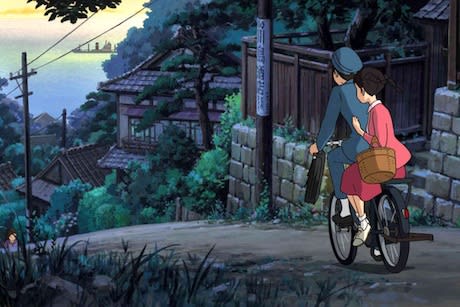What's peculiar about Goro Miyazaki's facile take on the importance of preserving history, From Up on Poppy Hill, is that it doesn't benefit from the animation format. The textures, details and gliding movement of the characters are technically apt and wondrous to behold, but the story, which finds teen Umi (Sarah Bolger) discovering love while running her family's boarding house after the death of her father, would have been just as effective in a live-action capacity.
Where his father (master director Hayao Miyazaki) has demonstrated the ability to transport the viewer into another world while offering a rich thematic backdrop with works like Princess Mononoke and Spirited Away, Goro's attempts (this and Tales From Earthsea) have fallen flat.
Even the clumsy, unimaginative template of nostalgia, brought on when Umi decides to enlist the girls to help the boys at her school save a dilapidated clubhouse from local modernization in preparation for the 1964 Tokyo Olympics, doesn't pack any punch. There's a sense of gravity about the many costs that war has had on society — women have more responsibility and the younger generation seems to be perpetually in mourning, lacking the identity that stems from a traditional family — but it's all just Conservative, staunchly male noise. This is ironic, considering that the source of the material is a female Manga series.
Perhaps knowing that the "save the clubhouse" plotline is glib at best, drawing upon the broadest of broad tropes with gender collaboration and an undiscerning, yet rigid preservationist perspective, Miyazaki injects a faux-incest love story angle that reiterates the importance of understanding history. Once Umi starts developing feelings for Shun (Anton Yelchin), the pseudo-alpha-male of the clubhouse, she learns that they may very well have the same father — another cultural tidbit stemming from war — which is similarly handled broadly, with forced melodrama.
It's a shame that the connective elements within Poppy Hill feel so contrived and that the animation isn't used in a creative capacity, since the film itself has the look and feel of something that should be far greater than it is.
Still, it's a marked improvement upon Goro Miyozaki's first offering, which suggests that practice might eventually make him a decent filmmaker.
(Studio Ghibli)Where his father (master director Hayao Miyazaki) has demonstrated the ability to transport the viewer into another world while offering a rich thematic backdrop with works like Princess Mononoke and Spirited Away, Goro's attempts (this and Tales From Earthsea) have fallen flat.
Even the clumsy, unimaginative template of nostalgia, brought on when Umi decides to enlist the girls to help the boys at her school save a dilapidated clubhouse from local modernization in preparation for the 1964 Tokyo Olympics, doesn't pack any punch. There's a sense of gravity about the many costs that war has had on society — women have more responsibility and the younger generation seems to be perpetually in mourning, lacking the identity that stems from a traditional family — but it's all just Conservative, staunchly male noise. This is ironic, considering that the source of the material is a female Manga series.
Perhaps knowing that the "save the clubhouse" plotline is glib at best, drawing upon the broadest of broad tropes with gender collaboration and an undiscerning, yet rigid preservationist perspective, Miyazaki injects a faux-incest love story angle that reiterates the importance of understanding history. Once Umi starts developing feelings for Shun (Anton Yelchin), the pseudo-alpha-male of the clubhouse, she learns that they may very well have the same father — another cultural tidbit stemming from war — which is similarly handled broadly, with forced melodrama.
It's a shame that the connective elements within Poppy Hill feel so contrived and that the animation isn't used in a creative capacity, since the film itself has the look and feel of something that should be far greater than it is.
Still, it's a marked improvement upon Goro Miyozaki's first offering, which suggests that practice might eventually make him a decent filmmaker.
